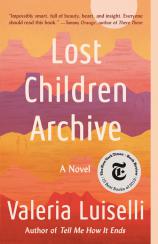Lost Children Archive
Review
Lost Children Archive
Last year, I read Valeria Luiselli’s book-length essay, TELL ME HOW IT ENDS, which was a nonfiction account of her experience serving as a volunteer translator for undocumented immigrants --- primarily young children traveling unaccompanied from Central America to the United States. I’ve since recommended this book to many people struggling to understand the complicated issues at the southern border, particularly in regard to children, that have been ongoing and evolving over the past decade or so.
At an event I attended where Luiselli was interviewed about TELL ME HOW IT ENDS, she mentioned that she was working on a novel that took up many of the same themes. I was intrigued, to say the least --- and so pleased to discover that that novel, LOST CHILDREN ARCHIVE, offered an even more profound and emotional exploration of migrant children, while still grounding her narrative in historical research and contemporary facts.
The book has two narrators, both unnamed. The first half is narrated by a woman. She and her husband --- whom she met when they were paired up on a grant-funded documentary project to record the sounds of all the languages spoken in New York City --- have been together for several years. They have no children together, but are jointly parenting the man’s 10-year-old son from his first marriage and the woman’s five-year-old daughter from hers. After the conclusion of their joint research project, the husband begins to grow increasingly restless. He throws himself into a new venture, traveling to the US Southwest to capture the sounds of the landscape once occupied by Apaches like Geronimo and Chochise.
"Luiselli continues her project of documenting the crises of our time, contextualizing them not only within our country’s history but also within an emotional narrative that profoundly illustrates the power of fiction to ignite readers’ knowledge and empathy."
Meanwhile, the wife has become involved as a translator and advocate for unaccompanied minor migrants and their families, and has become especially caught up in the story of one woman, whose two young daughters have gone missing en route from the southern border. The woman wonders if accompanying her husband on the trip might be an opportunity to embark on her own documentary project, documenting the stories and sounds of the hundreds of unaccompanied children who have begun to arrive at the southern border.
Their road trip takes on a poignant tone, since the woman suspects that, at the end of the summer, the boy and his father will remain in the Southwest, the girl and her mother will return to New York City, and their marriage will be over. As they travel farther away from the home they once built together, the husband tells stories of the Apaches and other Native groups displaced throughout history, and the family listens to news reports of kids separated from their families (as well as an audiobook of LORD OF THE FLIES), the two children enact more and more violent and elaborate imaginative games and stories that recapitulate the disturbing real-life narratives they’ve been absorbing.
Much of the novel’s second half is narrated from the boy’s point of view, as he struggles to understand what is happening in their family and in the world around them. He and his stepmother take turns reading aloud and recording chapters from a (fictional) book entitled Elegies for Lost Children, a harrowing account of the journey of seven children aboard “La Bestia,” the dangerous freight trains traveling toward the United States through Mexico. The bravery and resilience of these children, and the dire circumstances that lead them to undertake this incredibly dangerous journey, is heightened by the boy and his mother’s own growing realization that they are soon to be separated for far more innocuous reasons --- the amicable dissolution of a marriage --- and to imagine how even more acute the pain of separation must be for families torn apart by politics and borders, or even perhaps by death.
LOST CHILDREN ARCHIVE is stunningly written, filled with passages --- both factual and invented --- that beg to be read aloud or underlined (the female narrator confesses at one point that, when reading, “I underline too much, sometimes entire pages” --- I felt much like her as I was reading this novel). It’s also inventive in structure, with sections detailing the books and materials the travelers choose to bring along on their trip, a closing section with the Polaroid photos the boy uses to document their journey, and one particularly harrowing chapter that consists essentially of a single breathless sentence from the boy’s point of view.
In LOST CHILDREN ARCHIVE, Luiselli continues her project of documenting the crises of our time, contextualizing them not only within our country’s history but also within an emotional narrative that profoundly illustrates the power of fiction to ignite readers’ knowledge and empathy.
Reviewed by Norah Piehl on February 22, 2019
Lost Children Archive
- Publication Date: February 4, 2020
- Genres: Fiction
- Paperback: 384 pages
- Publisher: Vintage
- ISBN-10: 0525436464
- ISBN-13: 9780525436461




